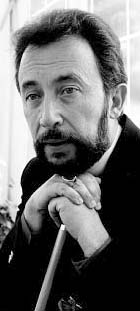|
Mexico's Bishop Carranza thrives on big challenges by Carol Barnwell ``I used to play church and baptise all the dolls and dogs,'' Bishop Sergio Carranza-Gomez says of his childhood in Mexico City. ``Cats,'' he remembers, ``were reluctant pagans by their nature.'' The ability to meet a challenge continues among the skills of the affable Bishop of Mexico, who as a boy aspired to the priesthood and now works to build the self-sufficiency of his diocese.
In the last decades of the 19th century, a chance meeting on the tiled, colonial plaza of Guadalajara began his family's heritage of service to the Anglican Church in Latin America. Bishop Carranza's great-grandmother, disenchanted with the Roman Catholic Church, struck up a conversation with the local Anglican priest and it wasn't long before she became an active member of his Spanish-speaking congregation. Later, her son was ordained and her daughter married a priest. In 1989, more than a century after her introduction to the Anglican Church, her great-grandson was elected Bishop of the Diocese of Mexico. ``I idolised my Uncle José,'' Bishop Carranza says of his great-uncle, who was Dean of the Cathedral in Mexico City. ``He was pleased that I wanted to become a priest but died before I went to seminary.'' Bishop Carranza graduated from Virginia Theological Seminary in the United States and was ordained a deacon at St. Paul's in Washington, DC, by Bishop William Creighton (son of the second bishop of Mexico) in 1967. Auspicious beginning When he became vicar of an English-speaking congregation in Monterrey, Mexico, ``almost'' everyone was pleased, he says. He remembers especially the senior warden's reaction. ``He told me he was used to seeing Mexicans in the garden and the kitchen, not the pulpit,'' Bishop Carranza says. When the man eventually returned to church, the matter was not discussed. Three short years later, Bishop Carranza returned to Mexico City as Dean of the Seminary and in 1973, ``with the help of a good group of lay people,'' began a congregation which was to became the first Spanish-speaking, self-supporting parish in the diocese. He served as chancellor and executive secretary with Province IX (which gave rise to the Province of Mexico) in the late '70s and early '80s, and was elected Bishop of Mexico after the diocese was divided into Cuernavaca and Mexico in 1988. Currently, the diocese has 32 congregations, five of which are self-sustaining. They have 9,000 active communicants and around 15,000 baptised members. ``Our goal is for all of our churches in the cities to become parishes.'' Bishop Carranza finds the challenge for Anglicans in Latin America is to be ``a real alternative to traditional, popular Roman Catholicism,'' and he has emphasised a deepening of spiritual life and commitment to stewardship as part of his diocesan vision. Mexico City, one of the world's most populated cities, is choked with pollution, poverty and millions of unemployed people from its countryside. Although the diocese is involved in many ministries to those who are desperately poor, Bishop Carranza is careful about outreach. ``I don't want to begin programmes we can't support,'' he says. His concern for the relatively new Province of Mexico is isolation. Bishop Carranza believes the province was granted autonomy prematurely and didn't have three crucial things: ``a sense of accountability, a sense of ownership and a clear sense of what our mission is. ``One of my concerns as a province is that we can't speak the common language of the Anglican Communion and that is isolating,'' he stresses. To fight the threat of isolation, the Diocese of Mexico has become a resource in Hispanic ministry for the Anglican Communion. It has sent Christian education teachers to the companion diocese of Texas to help with Hispanic work and offers summer programmes and conferences in being Anglican within the Hispanic culture. Although he joins other Spanish-speaking bishops in feeling sidelined by Africa at the Lambeth Conference, Bishop Carranza says he was ``pleased and humbled to be part of the Bible study planning team.'' He says the Bible study was planned to prompt conversation as ``Christians, as Anglicans, then as bishops to share our stories in light of what St Paul says. ``It's Christ's ministry which is shared with us. He uses our weakness to show His power and when we are weaker, we are stronger.'' Back to front page of this issue |

